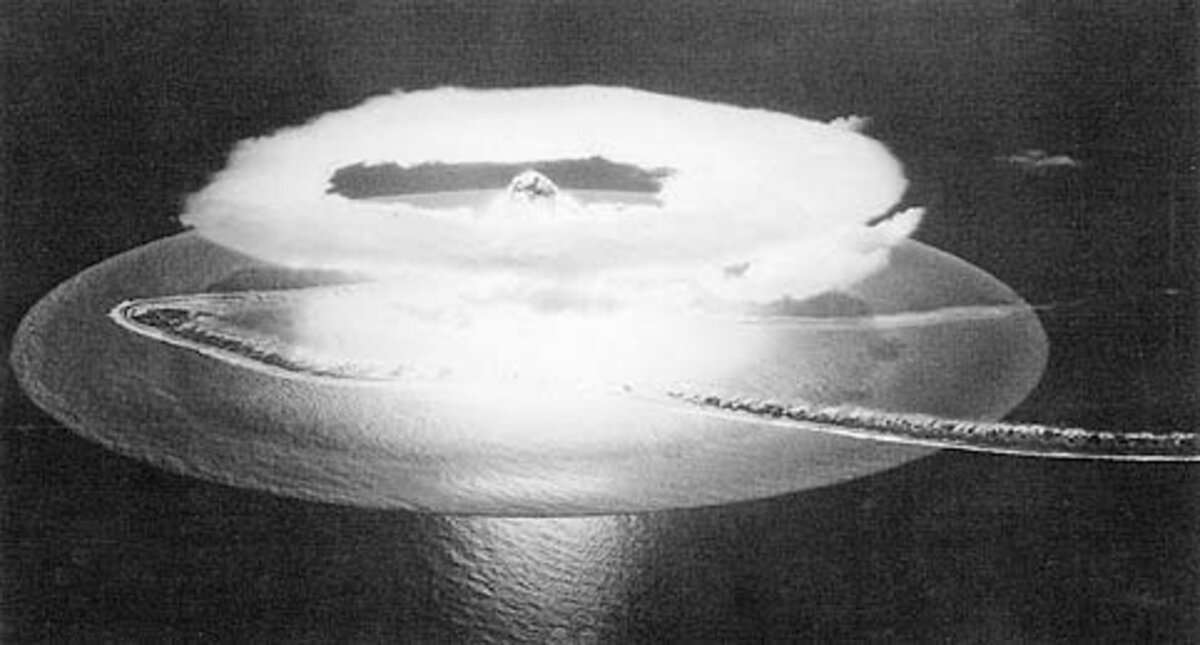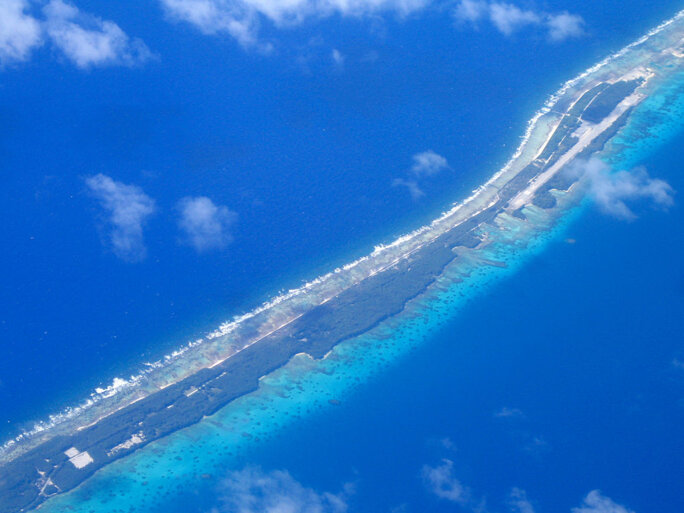In July 1966, France carried out the first of what would be a long series of nuclear weapons tests in the south Pacific territory of French Polynesia with an explosion in the lagoon of the Mururoa Atoll. Dozens of atmospheric explosions were carried out there and on the neighbouring Fangataufa Atoll until the tests were moved underground during the 1970s. The testing programme was finally ended in 1996.
The consequences upon the health and the environment of the Polynesian population have long been a subject of bitter controversy, and notably on the issue of compensation for those who became seriously ill as a result of the nuclear pollution.

Earlier this month, French Polynesian Member of France's Parliament (MP) Maïna Sage raised the subject during the session of MPs’ questions to government in France’s lower house, the National Assembly, citing the “193 tests” which she said amounted to 700 times the strength of the US nuclear bombing of the Japanese city of Hiroshima in 1945. Addressing French Prime Minister Manuel Valls, Sage reminded parliament that François Hollande had pledged, during his 2012 presidential election campaign, to fast-track the process of financial compensation demanded by civilian victims of the tests. “The French president engaged himself on [taking] strong action for compensation,” she told Valls. “I ask you, along with the rest of the government, to confirm that these acts of compensation will happen.”
In the pre-planned exchange, it was French health minister Marisol Touraine who answered Sage. “The Morin law was voted in 2010 to allow for the compensation of victims of the nuclear tests,” said Touraine. “The law did not produce the desired results and we set up an indemnity commission in the form of an independent authority. In a few moments I will propose a new decree that will allow for a review of the criteria of evaluation of the victims and to move forward.”
Her answer echoed a promise already made by Hollande during his visit to French Polynesia in February this year, when he publicly acknowledged the failure of both the independent commission Touraine referred to, called the CIVEN, and the so-called "Morin law" of 2010, named after the then-defence minister Hervé Morin, which was intended to open the door to compensation of victims of French nuclear tests both in French Polynesia and in the Sahara desert region of Algeria. Until now, just 20 of the 1,043 individual demands for compensation lodged by French Polynesians have been officially recognised as justified – representing less than two percent of demands.
This almost systematic refusal to recognise France’s responsibility to the victims, the cause of significant distress, is explained by the system used to calculate the abnormal levels of serious illnesses, notably thyroid cancers, among the Polynesian population. “Under the current system, it is those who have cancer who must prove that their illness is linked to one of the 193 explosions that were carried out between 1966 and 1977,” said Aline Archimbaud, a Green party senator who is recognised as a specialist campaigner for the compensation of Polynesian victims of the tests. “Illnesses sometimes appear ten or twenty years after an explosion, and the law takes into account the calculation of a compensation that is called a ‘negligible risk’. That’s to say that if the CIVEN software decides that the causal link between the nuclear test and the illness is inferior to 1%, the victim has no right to anything.”
Since the introduction of the so-called “Morin law”, this “negligible risk” assessment, which is behind most of the refusals for compensation, is at the heart of the deep division between the associations defending the rights of Polynesian victims of nuclear pollution and the French authorities.
Addressing parliament after Sage’s question to the government on July 6th, health minister Marisol Touraine set out the detail of a new decree that alters the criteria of the Morin law, and which places the “level of probability beyond which the risk [of contracting cancer] cannot be considered as negligible” at 0.3%.
Touraine’s intervention in response to Sage’s question was expected, and the president of the local government of French Polynesia had travelled to Paris to hear it. He described the move as one of “good sense”, and welcomed other measures announced by Tourain such as the decision to take into account the variable effects of radioactivity from an explosion on the health of one person or another, and also the decision to scrap the refusal of compensation to an individual for reasons of “absence of data” as proof of exposure to radioactivity at the time of the blast in question.

Enlargement : Illustration 2

Maïna Sage, along with other MPs campaigning for victims’ rights voiced support for the reform as a necessary passage for wider compensations, while calling for an end to the notion of “negligible risk” and its replacement by the recognition of a “presumption of causality” which would likely require the introduction of a new law and several years before it went before parliament.
Another group concerned by the effects of nuclear testing are the military veterans who were on site during the tests. Jean-Luc Sans, who himself took part in five nuclear tests, is president of the Association of Veterans of Nuclear Tests, called AVEN.”With this new mode of calculation, I think 60 percent of cases that I represent before the CIRVEN could have been accepted,” he said. He represents about 1,000 former military personnel and estimates that some 90,000 former servicemen were exposed to nuclear pollution in Algeria and French Polynesia. He said he understands the demands of “our Polynesian friends”, and called Touraine’s move “a very significant advance”.
But the associations defending Polynesian victims’ rights to compensation denounced the French government’s “contempt” towards the population and dismissed the decree as “tinkering measures” which will not allow proper compensation for victims. They regard the notion of “negligible risk” as an iniquity. “This mode of calculation is not only unjust, it [also] serves to limit the number of people compensated,” said Patrice Bouveret, a member of one such association, the Observatory of Weapons. “The reason is that the government does not want to recognise that the tests it practiced placed citizens’ lives in danger. It is also about not placing into question the all-nuclear choice, to not worry the populations who live alongside nuclear plants on the French mainland. The choice not to compensate several thousand Polynesians cannot be explained other than as ideological posturing.”
On the occasion of the 50th anniversary of the beginning of the nuclear tests in French Polynesia, the subject is something of an open wound for the local population. Commemorations have been held on the Tuamotu Archipelago where the explosions were carried out. One of the principle issues concerns the alleged higher than normal malformations and illnesses suffered among children of Polynesians who worked on the testing. “These children are absolutely not taken into account by the compensation calculations,” said Senator Aline Archimbaud. “Yet the health situation demands strong political intervention. Justice should not go begging.”
The EELV Green party MPs in French parliament have on several occasions called for French Polynesia to be granted independence, but to no avail. The French military continue to control the former testing grounds and no independent authority has been given permission to carry out research on the effects of decades of intensive nuclear explosions.
-------------------------
- The French version of this article can be found here.
English version by Graham Tearse


